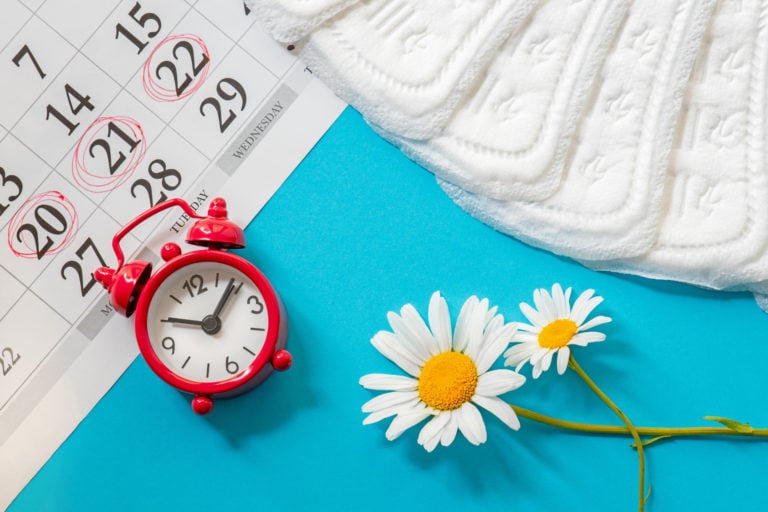Irregular periods, while they may sound unusual, are actually fairly common. For teen girls, in fact, irregular periods are often part of the normal process of puberty, as the menstrual cycle gets started. Some irregular menstrual cycles, however, may be signs of larger problems. Find out more in this section and the articles that follow. If you would like to better track your symptoms in order to speak to a medical professional, check our our Symptom Checklist.
What is a “regular period”?
The “average” cycle length for most women is 28 days, with ovulation (when an egg is released from the ovary) occurring roughly in the middle, around day 14. However, it is perfectly normal to have a cycle that’s either consistently a little longer or a little shorter from that “textbook” figure of 28 days.
Many women have consistently 26 day-cycles, or 31 days, and so on. It’s even normal for the typical length of a woman’s cycle to vary by a day or two each month (e.g., 27 days one month, then 26 days the next, then 28 days the next, and so on). It’s also normal to have the odd period here and there that is a handful of days longer or shorter than the rest of the others (that is, if your cycle is almost always 27 days long, but one month this year your period didn’t start until day 31).
What does it actually mean to have “irregular periods?”
The actual definition of an irregular period is when a woman experiences one of the following conditions on a consistent basis: a) her period is shorter than 21 days or longer than 36 days, or B) varies by 5 or more days (e.g., one cycle is 22 days long, then the next is 40 days long, and the next is 34 days long, and so on.)
What is the luteal phase, and what does it have to do with irregular periods?
It is important to note that “irregular period” is something of a misnomer. It’s not so much your period that’s irregular, as your ovulation time. If your cycle constantly varies in length, it is because you are not ovulating around the same time each cycle.
The length of your cycle (that is, the number of days between periods) is determined more so by when you ovulate that cycle than by anything else.
Let’s break that down: The time between when you ovulate and when you menstruate is known as the “luteal phase,” and it is actually fairly consistent in length from cycle to cycle; for most women with a healthy cycle, the luteal phase will be between 12-16 days long. So, if your luteal phase is typically 12 days long, and you ovulate on day 15, you can expect your period to start around day 28 of your cycle. But if you ovulate a few days earlier the next month—say, on day 13—you can probably expect your period to start around day 26 of that cycle.
Can irregular periods ever be normal?
For many adolescent girls just beginning to experience their menstrual cycle, the typical hormonal fluctuations that take place during puberty often make for some normal irregularity in cycle length. (This is also true of the postpartum and perimenopausal periods when hormones are fluctuating significantly.) As the teenage body continues to develop, it may take a while for the body—and, in turn, the menstrual cycle—to self-regulate, as it adjusts to the new hormonal fluctuations taking place.
Why are my periods irregular, and what causes an irregular period?
A truly irregular period (as defined above in the first question) is actually a symptom of a larger, underlying issue. Some conditions that can cause irregular periods include prolonged stress, illness, over-exercise, extreme weight loss or gain, various thyroid dysfunctions, hormonal imbalances, endometriosis, and polycystic ovary syndrome (PCOS).
Can birth control regulate my period?
No, birth control cannot regulate your period. Hormonal birth control actually shuts down your cycle, preventing you from ovulating or menstruating (i.e., having a period) at all. While you may bleed monthly while taking birth control, this is known as a “withdrawal bleed” and is not actually a period (which, by definition, must be preceded by ovulation).
While birth control does not regulate an irregular period, it may appear to regulate things by minimizing the symptoms of PMS or underlying issues like PCOS or endometriosis. You may also bleed on a more regular schedule while on birth control–although, again, this is not actually a period. (Note that some women actually experience even more irregular bleeding while on birth control than they do off of it, which is especially the case with non-estrogen/progestin-only forms of hormonal birth control.)
Unfortunately, what’s actually happening is that synthetic hormones are overriding a woman’s natural cycle. If her cycle irregularity is due to an underlying health issue, hormonal birth control, like the Pill, patch, shot, vaginal ring, implant, or IUD, will simply mask the underlying causes of the irregularity, and those issues will likely still be present once the woman goes off of birth control.
Can I chart my cycle with fertility awareness if I have an irregular period?
Yes! It is an inaccurate but common assumption that fertility awareness methods (FAM) of cycle charting are only for women with regular periods. Not only is it true that a woman with irregular periods can use fertility awareness, FAMs can better serve a woman with irregular periods, because charting her body’s signs can help pinpoint any underlying issues that may be causing or contributing to her irregular cycle.
Can I cure irregular periods?
Doctors who practice restorative reproductive medicine (RRM) are best equipped to diagnose and treat the underlying conditions that cause or contribute to irregular periods. Rather than using band-aid, quick fixes like birth control, restorative reproductive medicine doctors and allied healthcare professionals work to uncover and treat the root causes of irregular periods.
Natural Procreative Technology (also known as NaProTechnology) is one such field of restorative reproductive medicine that can utilize the information from a woman’s chart (along with other diagnostic tests and procedures) in order to treat the cause(s) of her irregular periods. NaPro-trained doctors, as well as medical professionals trained in Fertility Education & Medical Management (FEMM), are available throughout the United States and beyond, and treatments are often covered by insurance.
How can I fix irregular periods without birth control?
First, you will need to determine the underlying cause of your irregular period by charting your cycle and working with a doctor who is knowledgeable in restorative reproductive medicine. If you would like to better track your symptoms first, check our our Symptom Checklist. Once you and your doctor have determined the underlying cause of your irregular periods, there are a variety of approaches that can be taken in order to truly regulate your periods.
What does it mean if I have an irregular period with brown blood or spotting?
Brown bleeding at the beginning of your period or brown bleeding toward the end of your period (often referred to as “tail-end brown bleeding”) can be a sign of an underlying issue. Tail-end brown bleeding is usually a telltale indicator of luteal phase deficiency, as discussed above. It can also be indicative of other issues, such as endometriosis or PCOS. Let your doctor know if you experience brown bleeding whether or not your periods are irregular.
Spotting (bleeding that occurs outside of menstruation) can be caused by many different things, from certain sexually-transmitted infections, to fibroids, to PCOS, to cancer. You should talk to your doctor if you experience spotting, regardless of whether or not your periods are also irregular.
Can irregular periods cause infertility? Can I still get pregnant with an irregular period?
Irregular periods themselves do not cause infertility, but they can be a symptom of an underlying issue that may cause or contribute to infertility. Again, this is why getting to the bottom of an irregular period is key—and where FAMs are significantly more helpful than birth control when it comes to addressing irregular periods.
Does an irregular period affect ovulation or your ability to get pregnant?
As we talked about above, the timing of ovulation will determine when your period will start—not the other way around. However, highly variable ovulation and a short luteal phase may go hand-in-hand, and a too-short luteal phase (typically 10 or fewer days) can make it very difficult to get or to stay pregnant. If you and your doctor determine that you have luteal phase deficiency, there are treatment protocols available to help lengthen the luteal phase and make pregnancy achievable and sustainable.
Is an irregular period a sign of pregnancy?
If your period is late and you have been sexually active, there is a chance that you could be pregnant. Charting your cycle regularly can help you determine how long your luteal phase typically is. If your luteal phase is suddenly significantly longer than it has ever been (e.g., if your luteal phase is typically 12 days long, but you are now on day 17, with no period in sight), or if it gets to 18 days long or longer, you may be pregnant.
What should I do if I’ve had an irregular period for months or years?
A helpful first step is to start charting your cycle so you can have clear information to bring and discuss with your doctor. Consider finding a restorative reproductive medicine doctor, whom you can trust will understand irregular periods and their causes. Your chart will provide invaluable information to you and your doctor to discuss underlying factors that may be responsible for your irregular period. Again, if you would like to better track your symptoms first, check out our Symptom Checklist.
This page was last updated on April 18, 2024.
For more on irregular periods, see the articles below.
-

What’s the connection between irregular cycles and cardiovascular disease?
By Kristen Curran • April 21, 2023It’s no surprise that the menstrual cycle can reveal important information about a woman’s reproductive health, but when… -

Teens and irregular periods: What’s normal—and what’s not (Part II)
By Christina Valenzuela • March 25, 2022Part 2: How to look out for common teen cycle issues In Part I, we learned about why… -

Teens and irregular periods: What’s normal–and what’s not (Part I)
By Christina Valenzuela • March 25, 2022Part I: When to call a doctor The teenage years are hard enough for parents managing the ever-shifting… -

How I started healing my painful, irregular periods with the switch to fertility awareness
By Mary Fagan • June 11, 2021I woke abruptly that midwinter morning, with my body beginning to shake and heat rising to my face. As… -

How My Problems with Irregular Periods were Solved by FAMs (Not Birth Control)
By Taryn DeLong • January 21, 2021Many believe that fertility awareness methods (FAM) only work for women with “regular” cycles—which means they are ineffective… -

The Links between Irregular Cycles, Birth Control, and Early Death
By Cassondra Moriarty • January 16, 2021In the fertility awareness world, it is no secret that we advocate for the medical community to consider… -

“What causes irregular periods, and can you fix them without birth control?” and other questions: A Natural Womanhood Irregular Periods FAQ
By Natural Womanhood • June 19, 2020Before diving into our first question about irregular periods, let’s first establish what a “regular” period looks like.… -

Good news! You can use fertility awareness methods even if your cycles are irregular
By Cassondra Moriarty • July 13, 2019“Fertility Awareness-Based Methods only work if you have regular periods.” I hear it all the time. This perception… -

What an Irregular Period Means, and How the Pill Doesn’t Help
By Grace Emily Stark • July 21, 2018In middle school and high school, I remember multiple friends told me that their doctors had just put…





